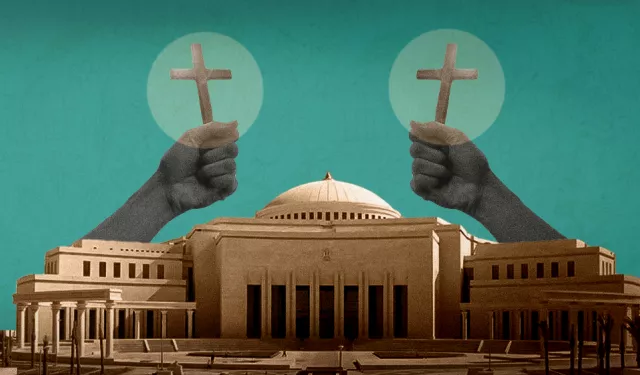
Beyond numbers: Egypt’s Christian quota fails to deliver representation
The representation of Christians in Egypt’s legislatures after the 2014 constitution has been hailed as a milestone. In the 2015–2020 parliament, Christians held about 6% of the seats; 39 out of 596 seats. Thirty-six were elected (24 from party lists, 12 as independents), and three were presidential appointees from the 28 constitutionally reserved seats.
The current 2020–2025 parliament includes 38 Christian members: 28 elected on party lists, three independents, and seven appointed. On paper, the figures suggest progress after years of near exclusion, yet little has changed in how parliament approaches questions of citizenship and equality.
Representation without influence
The higher numbers have not brought greater advocacy for equal citizenship or a stronger role in addressing sectarian tensions and violence. During the recent parliamentary campaign, for instance, sectarian unrest in the village of Nazlet Gelf in Minya dominated public discussion. Authorities settled the crisis through an extralegal “customary reconciliation” session run by security officials, leaving accountability aside.
Notably absent were the very parliamentarians elected for their Christian identity. Of Minya’s two Christian MPs, including one from the same district, neither intervened nor spoke publicly. Only Freddy Elbayadi and Maha Abdel Nasser of the Egyptian Social Democratic Party called for a formal investigation and for holding accountable those who prioritized custom over law.
When Egypt’s 2014 constitution drafting committee adopted affirmative representation for marginalized groups—women, Christians, youth, and people with disabilities—the aim was inclusion, not symbolism. The quota system was meant to mirror national diversity and widen participation. Yet ten years later, it has yielded more frustration than progress.
Limited in power and oversight, the House has neither defended freedom of belief nor addressed sectarian violence. Quotas, it seems, cannot substitute for political will.
The quota dilemma and its execution
In my study for the Egyptian Initiative for Personal Rights, titled “Parliament and Religious Affairs: An Analytical Review of the 2015–2020 Session,” I assessed the chamber’s record in building democratic mechanisms for managing religious diversity. The findings showed decline not progress—even the modest debate, that was once allowed, on sectarian violence and discrimination has narrowed.
Over the past decade, new laws including the Church Construction Law, have expanded state control over religion discriminatory in both spirit and practice. Parliament has avoided debate on most sectarian incidents, and MPs’ motions to question officials are routinely dismissed, even when negligence or complicity was evident.
The problem is not the quota, but its implementation.
Egypt’s electoral environment remains tightly managed. State institutions continue to engineer outcomes, undermining fair competition and blocking credible, independent candidates.
Quotas have shifted from tools of empowerment to instruments of appointment—names placed on state-approved lists with minimal voter input.
Rather than preparing marginalized groups to compete, the quota system now rewards loyalty. Seats go to state-backed figures, not independent community voices. The intended purpose—creating equitable access and nurturing democratic competence—has vanished.
Two birds with one stone
A major distortion lies in stacking quotas to fulfill several inclusion targets at once—often reducing Christian representation in the process.
Take the current elections, just five of 28 Christian National List candidates across the four super-districts were men—about 17% of the Christian quota—down from 28% (eight out of 28) in 2020.
On the Delta lists, east and west, Christians were exclusively female; the Cairo list included only one male candidate—current MP Freddy Elbayadi—out of ten Christians. This pattern recalls pre-2011 practices, when former President Mubarak appointed Christian women to satisfy both “Coptic” and “women’s” quotas simultaneously.
This tokenism sidelines capable Christian men and women, replacing them with appointees selected only to fill gender, youth, or disability quotas.
A fragile gain under tight control
Admittedly, overt sectarian campaigning and hate speech, once common before 2015, have declined. The weakening of Islamist movements, coupled with state control and security restrictions, has muted open sectarian rhetoric.
But the change is superficial. Public attitudes and voting patterns remain largely unchanged, and elections still deny marginalized groups a fair contest based on merit or ideas.
Abolishing quotas is not the answer—they are constitutional, legitimate, and necessary. The real failure lies in their use as patronage, stripping them of any transformative power.
Published opinions reflect the views of its authors, not necessarily those of Al Manassa.
